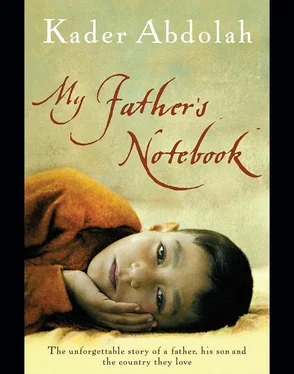Fourteen centuries ago, Muhammad called his followers together after a great victory. According to tradition, Muhammad stood on a camel, lifted his son-in-law Ali by the belt and cried, “Whoever loves me, must also love Ali. Ali is my soul, my spirit and my successor.”
The Sunnis think the Persians made this story up. That’s why the Persians and the Arabs are always squabbling and why there’s constant war and bloodshed.
Ali himself was killed with a sword while praying in the mosque.
His son and successor Hassan was kept under house arrest for the rest of his life. Hussein, the third successor, was beheaded. His head was stuck on a pole and displayed on the town gate. Zayn al-’Abidin, the fourth successor, lived a life of seclusion. Baqir recorded large numbers of traditions. Sadeq had his freedom severely curtailed: he wasn’t allowed to show himself in public during the day, or to walk past a mosque. Kazem died in prison. Reza was poisoned by purple grapes. His grave has become one of the holiest places in Iran.
Little is known about Hassan, the eleventh successor. But Mahdi, the twelfth and last successor, escaped an attempt on his life and sought refuge in Persia.
Since then Mahdi has occupied a special place in the hearts, as well as in the literature and religion, of the Persians.
The following story cannot be found in the Holy Book, or in any other book, and yet the villagers on Saffron Mountain believe it and tell it to their children:
The night the Arabs tried to kill Mahdi, he fled to our country, where the majority of his followers lived .
He sought refuge in the east, which is where we live.
He climbed up our mountain — first on horseback, then on a mule and finally on foot — until he reached the cave. There he spent several nights.
If you take an oil lamp and go into the cave, all the way to the very back, you will still see, even today, the ashes of his fire.
Mahdi wanted to stay in the cave even longer, but the Arabs fol lowing him had managed to track him down.
So he climbed even higher, until he reached that miraculous rock face. There he realised that he was going to be Muhammad’s last successor and that he had to hide in the well and wait until he was called.
Many centuries have gone by since then. He’s still waiting in the well. In the well of Mahdi ibn Hassan Askari.
Thus it became a sacred place.
Every year thousands of pilgrims climbed up Saffron Mountain. They rode mules halfway up the mountain, to about 8,000 feet. There they spread their carpets out on the rocks and sat down, drank some tea, cooked some food and talked until deep into the night. The moment the moon went down behind the mountain peak, they all fell silent. In that great silence, they stared at the sacred well until a wondrous light struck the rock face, a light that seemed to come from a lamp inside the well. It shone briefly, then disappeared. The watching pilgrims all knelt in prayer.
The pilgrims believed the story and told each other that the light was the reflection of the oil lamp by which Mahdi read his book.
Yes, the Messiah sat in the well, reading and waiting for the day when he would be allowed to leave.
The well itself was inaccessible to ordinary mortals. It was also off-limits to foreigners, especially those who wanted to climb up to it with ropes and spikes.
Some of the villagers were able to reach it by jumping from ledge to ledge on the narrow mountain paths like nimble-footed mountain goats. Only a handful of the men in Saffron Village had ever accomplished this feat. Aga Akbar was one of them.
When Aga Akbar was little, his mother often talked about Mahdi.
“Does he really live in the well?” he asked her.
“Yes, he really does. God is in the sky and the holy man is in the well.”
“Have you seen him in there?”
“Me? Heavens, no, I can’t climb up there. Only a few men have ever reached the well. They looked into it and saw the holy man.”
“Who? Which men?”
“The men who wear a green scarf around their necks. Haven’t you ever noticed? They walk through the village with their heads held high.”
“Will I be able to climb up to the well some day?”
“You have to have strong legs. But you also have to be clever and daring.”
He’d attempted the climb a few times, but had always turned back halfway. At a certain point the narrow paths were so unsafe that you didn’t dare take another step. Perhaps the paths could be crossed only once, perhaps they’d collapse behind you. How would you get back if there was no path?
You couldn’t think about that as you climbed, or you’d never reach the well. How could anyone dare to go to a place from which he might never return?
That was the secret. It wasn’t just a matter of strong legs and quick wits, but also of necessity. You had to be prepared to leave your life behind, to say goodbye, to bid your life farewell. Only then could you reach the well.
Aga Akbar was prepared. After his wife’s death, he’d reached a point where he wanted to go to the well and never come back again. He needed the holy man. He needed to kneel at the well and admit that he was afraid, that he no longer dared to live.
Just when his bride was being placed in her coffin so she could be carried to her grave, he slipped out through the back door. He started up the mountain in order to forget life.
People looked all over for him. The entire village was waiting at the cemetery, wondering where he could have gone.
Kazem Khan decided to go look for him in the mountains. He thought he knew where his nephew was headed, but he was afraid that Akbar wouldn’t be able to reach the well, that he’d fall and no one would be able to rescue him.
He saddled up his mule, grabbed his binoculars and climbed the mountain. He rode until the animal refused, or perhaps didn’t dare, to go any farther. He stood on a rock and peered at the sacred spot through his binoculars. No Akbar in sight.
He looked again to see if … Wait a minute, someone was kneeling down, touching his forehead to the ground, or, rather, looking into the well. No, he was sitting on his knees and writing.
“What a clever boy!” Kazem Khan said and laughed aloud. Akbar had reached the well!
What could he do to help him? Nothing, no one could do a thing.
Kazem Khan laughed again. The mountain echoed his laughter. “He’s reached the well!” he shouted. “My Akbar! Hurrah! Hurrah for him! Hurrah for me! Let him weep! Let him write! Ha, ha, ha. I wish I had my pipe. Oh, God, I wish I’d brought my opium. Then I’d sit on this rock and watch him and quietly smoke my pipe.”
How would Akbar get back down the mountain? Don’t worry. Anyone who could make it up to the well ought to be able to get back down. Clever mountain goats always find their way home again.
What should he do? Wait for Aga Akbar here or go home?
He retraced his steps, for now he had a reason to celebrate, a reason to sit on his pipe-smoker’s carpet. Maybe it wasn’t quite the thing to do, he thought, given that Akbar’s wife had just been buried, but her family should have mentioned their daughter’s illness. We’re not going to mourn, we’re going to celebrate! We have to help Akbar get over her death. We’ll hold a party, first thing in the morning. No, we’ll hold it now, tonight, in the dark. I’m going to say to everyone I see, “Hurry! Hurry! Go up onto your roof! Salute my nephew! He’s reached the well!”
Kazem Khan went straight to the house of his oldest sister. “Where are you? Go and get a green scarf for Akbar! What a man! Our Akbar has reached the sacred spot. At this very moment, he’s standing at the edge of the well! Here, take the binoculars! Hurry! Go up onto the roof! Look! He’s still standing there!”
Читать дальше












